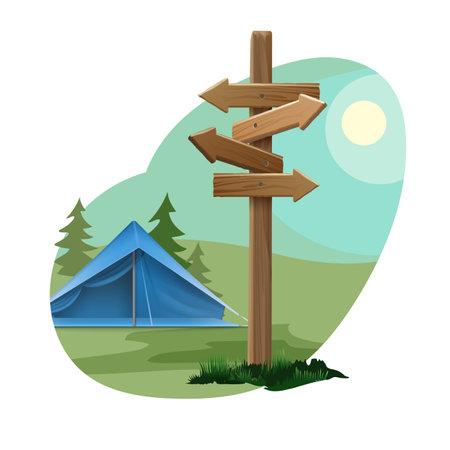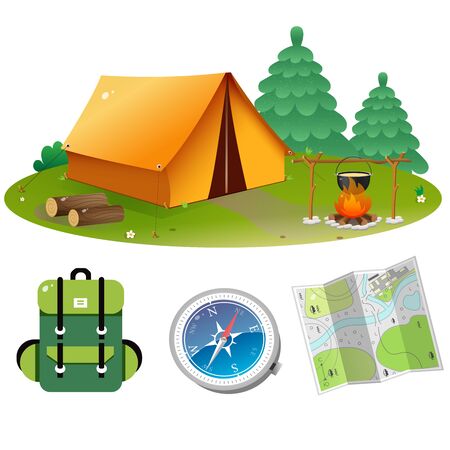1. Lack of Trip Planning and Coordination
Many group camping trips fall apart before they even begin. Why? Poor communication, no clear roles, and a missing or vague itinerary can lead to chaos. When planning a group camping trip, it’s essential to take the time to organize everything in advance so everyone knows what to expect and how they can contribute.
Get Everyone on the Same Page
Start by choosing dates that work for the whole group. Use tools like Google Calendar, Doodle polls, or a shared group chat to find a weekend that suits everyone. Once the date is locked in, move on to selecting the campsite. Make sure it fits your groups needs — consider amenities, location, accessibility, and activities nearby.
Assign Clear Roles
Delegating responsibilities makes planning smoother and ensures no one feels overwhelmed. Here’s a simple example of how you might assign tasks:
| Task | Assigned Person |
|---|---|
| Booking the Campsite | Amy |
| Meal Planning & Grocery Shopping | Jake & Sara |
| Gear Checklist & Packing Coordination | Mike |
| Transportation Arrangements | Tina |
| Activities & Games Coordinator | Chris |
Create a Shared Itinerary
An itinerary doesn’t have to be packed minute-by-minute, but having a rough schedule helps manage expectations. Include arrival times, meal prep windows, hike schedules, and campfire time so everyone stays in sync.
Sample Itinerary Outline:
- Friday Evening: Arrive at campsite, set up tents, dinner prep.
- Saturday Morning: Breakfast, group hike.
- Saturday Afternoon: Lunch, free time or games.
- Saturday Night: Campfire dinner and s’mores.
- Sunday Morning: Breakfast, pack up and head home.
Tip:
Create a Google Doc or use apps like Trello to keep track of plans and let everyone access the same information anytime.
The more effort you put into planning up front, the more relaxed and enjoyable your trip will be for everyone involved.
2. Bringing the Wrong or Incomplete Gear
One of the most common group camping mistakes is either forgetting key gear or bringing too much of the same thing. It might seem harmless to have three can openers and no tent stakes—until youre in the middle of nowhere trying to cook chili in the rain. When multiple people are packing for one trip, things can get messy fast without a clear plan.
Why This Happens
It’s easy to assume someone else packed it. Or worse, everyone brings their own version of the same item, leading to unnecessary duplicates and missed essentials. Miscommunication and lack of planning are usually at the root.
How to Avoid It
The key is creating a shared master gear list and assigning responsibilities ahead of time. This helps make sure that every piece of gear is covered—without overlap—and that each person knows what they’re responsible for bringing.
Sample Master Group Camping Gear List
| Category | Essential Items | Assigned To |
|---|---|---|
| Shelter | Tents, ground tarps, stakes, mallet | Alice & Jake |
| Cooking | Stove, propane, pots/pans, utensils | Sara |
| Food & Water | Cooler, dry food bin, water jugs, filters | Carlos & Jen |
| Fire | Lighter/matches, firewood, firestarter | Mia |
| First Aid & Safety | First aid kit, bug spray, sunscreen | Nate |
| Comfort & Misc. | Chairs, lanterns, toilet paper, games | Kyle & Emma |
Packing Tips for Groups
- Create a shared Google Doc or spreadsheet: Everyone can see real-time updates and changes.
- Avoid last-minute packing: Give yourselves at least 48 hours to finalize gear assignments.
- Pretend youre packing as one unit: Think about whats needed for the whole group rather than individuals.
Avoid Packing These Common Duplicates:
- Coffee makers (assign one per group)
- Coolers (consolidate food storage)
- Lanterns (bring enough for common areas only)
Packing smart means packing light but complete. With a solid plan in place and clear roles assigned, your crew can focus on having fun—not figuring out who forgot the spatula.

3. Disregarding Group Dynamics and Camp Etiquette
Camping with a group can be an amazing bonding experience—but it can also go south fast if people arent on the same page. Clashes over noise levels, shared responsibilities, or conflicting personalities can turn a fun getaway into a stress-filled weekend. That’s why understanding group dynamics and respecting camp etiquette is key to keeping the vibe positive and drama-free.
Understanding Common Group Camping Conflicts
Here are some of the most common issues that pop up during group camping trips:
| Common Issue | Why It Happens | How to Prevent It |
|---|---|---|
| Noise Complaints | Some campers want to party, others want peace and quiet. | Set quiet hours ahead of time and respect campground rules. |
| Uneven Chore Distribution | A few people end up doing all the work while others relax. | Create a chore chart so everyone shares responsibilities fairly. |
| Clashing Personalities | Different communication styles or habits cause tension. | Pair up compatible tentmates and encourage open communication. |
| Lack of Shared Goals | No agreement on what the trip should be—relaxing vs. adventure-packed. | Have a pre-trip discussion about everyone’s expectations. |
Set Expectations Before You Go
The best way to avoid misunderstandings is by talking things out before you even pack your gear. Whether it’s a casual group chat or a quick meetup, make sure everyone knows the plan—including meals, daily schedules, and sleeping arrangements. This helps prevent surprises and sets the tone for collaboration rather than confusion.
Questions to Discuss as a Group:
- Who’s bringing what gear and food?
- What are our quiet hours?
- How will we divide cooking and cleanup?
- Are we planning activities together or doing our own thing?
Create Ground Rules Together
No one likes being bossed around, but having some basic ground rules makes things run smoother. The key is making these rules as a team so that everyone has buy-in. Keep it simple—think of them as “camp commandments” that help keep the peace.
Sample Ground Rules for Group Camping:
- Respect each other’s space and stuff.
- Stick to agreed-upon quiet hours.
- Help with at least one camp chore per day.
- If you use it, clean it or put it back where it belongs.
- No major decisions (like packing up early) without discussing with the group first.
Keep the Vibes Positive
Campsite drama kills the mood faster than a thunderstorm. If tensions rise, take a breath before reacting. Sometimes all it takes is a quick walk or stepping away from the situation to cool down. Encourage check-ins during the trip to make sure everyone’s still having fun—and don’t forget to celebrate small wins like successfully building a fire or spotting wildlife together!
Pro Tip:
If youre camping with kids or teens in the group, set age-appropriate expectations too. Give them small responsibilities so they feel included without being overwhelmed.
The more you plan ahead and stay flexible, the better your chances of having an epic group camping trip full of laughs, memories, and maybe even s’mores-fueled singalongs under the stars.
4. Poor Food Planning and Meal Prep
Nothing can derail a group camping trip faster than running out of food—or realizing no one packed anything people actually want to eat. When youre feeding a crowd, planning meals takes more than just grabbing a few hot dogs and calling it good. Without a solid plan, you risk hangry campers, wasted food, or worse, someone not having anything they can actually eat.
Plan for the Group, Not Just Yourself
When youre camping with a group, think big-picture. Start by creating a shared meal plan that covers all meals and snacks. Assign meals to different people or families so no one is stuck doing all the cooking. Use a spreadsheet or simple checklist to keep track of whos bringing what.
Sample Group Meal Plan:
| Meal | Whos Responsible | Main Dish | Sides |
|---|---|---|---|
| Friday Dinner | Team A | Chili with Ground Beef (and Veggie Option) | Cornbread, Salad |
| Saturday Breakfast | Team B | Breakfast Burritos | Fruit, Coffee |
| Saturday Lunch | Team C | Deli Sandwich Bar | Chips, Pickles |
| Saturday Dinner | Team D | Burgers (Beef & Veggie Patties) | Pasta Salad, Smores |
| Sunday Breakfast | Team E | Pancakes & Sausage | Orange Juice, Yogurt Cups |
Consider Dietary Restrictions Early On
No one wants to be the person who brought nothing gluten-free for your buddy or forgot about your cousin’s nut allergy. Ask about dietary needs before the trip and make sure every meal has at least one option for everyone. Labeling foods and using separate utensils can go a long way to avoid cross-contamination.
Avoid Overpacking or Underpacking Food
Packing too little leads to grumpy campers; packing too much means dealing with soggy leftovers or hauling uneaten food back home. Aim for balanced portions based on how many people youre feeding per meal. Here’s a quick guide to help estimate:
Food Quantity Guide Per Person (Per Meal):
| Food Item | Amount Per Person |
|---|---|
| Main Protein (meat/veggie) | 6-8 oz |
| Sides (rice, salad, etc.) | 1 cup total |
| Bread/Buns/Tortillas | 1-2 pieces |
| Dessert (cookies/s’mores) | 2 servings |
Crowd-Pleasing Recipes That Work Every Time
- Taco Bar: Set out tortillas, seasoned meat and beans, shredded cheese, salsa, lettuce, and guac—everyone builds their own plate.
- Campsite Foil Packs: Pre-chop veggies and protein like chicken or sausage; wrap in foil and toss on the fire—easy cleanup!
- Pasta Potluck: Cook pasta ahead of time; bring sauces like marinara or pesto. Add grilled veggies or meat as toppings.
Prep Smart Before You Go
The more you prep at home, the smoother things go at camp. Chop veggies ahead of time, pre-marinate meats in Ziploc bags, and label everything clearly in coolers. Bring extra trash bags for scraps and leftover disposal to keep critters away.
Quick Tips:
- Cooler Strategy: Use separate coolers for drinks and perishables to avoid constant lid-opening that melts ice fast.
- Labeled Bins: Organize dry goods by meal or day in stackable bins—it saves time when you’re rummaging around in the dark.
- Beverage Planning: Don’t forget plenty of water! Add coffee supplies and maybe some fun extras like hot cocoa mix or lemonade powder.
Nailing your food plan isn’t just about eating well—it sets the tone for the whole trip. A thoughtful meal setup makes everyone feel included, keeps energy up for hikes and games, and turns mealtime into one of the best parts of camping together.
5. Ignoring Safety and Environmental Responsibility
When youre out camping with a group, its easy to get caught up in the fun and forget about safety and environmental responsibility. But overlooking key safety practices or disrespecting nature can quickly turn a great trip into a bad memory—or worse, a dangerous situation.
Overlooking First-Aid Preparedness
Accidents can happen anytime—someone trips on a root, gets a burn near the campfire, or suffers from heat exhaustion during a hike. Having a well-stocked first-aid kit and knowing how to use it is essential. Make sure at least one person in your group knows basic first-aid and CPR.
Essential Items for Your Group First-Aid Kit
| Item | Purpose |
|---|---|
| Bandages & Gauze | For cuts, scrapes, and blisters |
| Antiseptic Wipes | To clean wounds |
| Tweezers | Remove splinters or ticks |
| Pain Relievers | Relieve headaches or minor pain |
| Allergy Medication | For allergic reactions or insect bites |
Being Unaware of Wildlife Risks
From bears to snakes to raccoons, wildlife encounters are part of the outdoor experience—but they should be handled with care. Avoid leaving food out, know what animals are native to the area, and teach everyone in your group how to react if they encounter wildlife.
Quick Tips for Wildlife Awareness
- Store food in bear-proof containers or hang it from a tree.
- Keep your campsite clean—no trash or crumbs left behind.
- Never feed wild animals—it’s harmful to them and dangerous for you.
- Make noise while hiking to avoid surprising animals.
Neglecting Leave No Trace Principles
The Leave No Trace (LNT) principles are not just guidelines—theyre essential habits for any responsible camper. Teaching everyone in your group these rules helps preserve natural spaces for future generations.
The 7 Leave No Trace Principles
- Plan ahead and prepare
- Travel and camp on durable surfaces
- Dispose of waste properly
- Leave what you find
- Minimize campfire impact
- Respect wildlife
- Be considerate of other visitors
A Group Effort Makes All the Difference
Safety and environmental responsibility aren’t just individual duties—they’re shared responsibilities. Assign roles within your group: someone watches over first-aid supplies, another monitors food storage, and someone else ensures LNT practices are followed. When everyone chips in, you’ll have a safer, more enjoyable trip—and leave the outdoors better than you found it.


